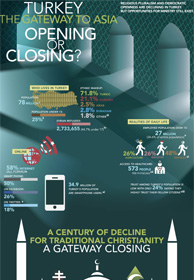Related Articles
Is Turkey, the Gateway to Asia, Opening or Closing?
Turkey is a key gateway between Asia and Europe, but is the door opening or closing? The answer is complex but worth diving in and exploring. Take some time to go in-depth into Turkey’s demographics, relationship with Christianity and current Evangelical Church.
Missionary Relationships: Powderkeg or Powerhouse?
Difficult relations between a mission’s personnel and its administration are among the problems that introduce stress into the lives of missionaries.
An Equal Partnership Structure
At the Green Lake consultation it looked as though another Lincoln-Douglas debate were shaping up. Dr. Louis King and Dr: George Peters both spoke on the principles and practices of mission-church relations.
An Equal Partnership Structure
At the Green Lake consultation it looked as though another Lincoln-Douglas debate were shaping up. Dr. Louis King and Dr: George Peters both spoke on the principles and practices of mission-church relations.
Pitfalls Missions Committees Must Avoid
Missions committees must constantly update their mission vision and strategy. Hedberg outlines nine pitfalls committees must avoid.

